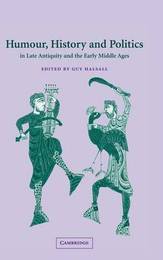
|
Humour, History and Politics in Late Antiquity and the Early Middle Ages
Hardback
Main Details
| Title |
Humour, History and Politics in Late Antiquity and the Early Middle Ages
|
| Authors and Contributors |
Edited by Guy Halsall
|
| Physical Properties |
| Format:Hardback | | Pages:224 | | Dimensions(mm): Height 229,Width 152 |
|
| Category/Genre | World history - BCE to c 500 CE
World history - c 500 to C 1500 |
|---|
| ISBN/Barcode |
9780521811163
|
| Classifications | Dewey:306.48109 |
|---|
| Audience | | Professional & Vocational | |
|---|
|
Publishing Details |
| Publisher |
Cambridge University Press
|
| Imprint |
Cambridge University Press
|
| Publication Date |
13 June 2002 |
| Publication Country |
United Kingdom
|
Description
Although the topic of humour has been dealt with for other eras, early medieval humour remains largely neglected. These essays go some way towards filling the gap, examining how early medieval writers deliberately employed humour to make their cases. The essays range from the late Roman empire through to the tenth century, and from Byzantium to Anglo-Saxon England. The subject matter is diverse, but a number of themes link them together, notably the use of irony, ridicule and satire as political tools. Two chapters serve as an extended introduction to the topic, while the following six chapters offer varied treatments of humour and politics, looking at different times and places, but at the Carolingian world in particular. Together, they raise important and original issues about how humour was employed to articulate concepts of political power, perceptions of kingship, social relations, and the role of particular texts.
Author Biography
Guy Halsall is Lecturer in History, Birkbeck College, University of London. His publications include Settlement and Social Organization: The Merovingian Region of Metz (Cambridge, 1995), Early Medieval Cemeteries: An Introduction to Cemetery Archaeology in the Post-Roman West (Glasgow, 1995) and (ed) Violence and Society in the Early Medieval West (Woodbridge, 1997).
Reviews'Whilst the overarching theme is humour and comedy, sophisticated issues of politics, hostility, and hermeneutics are raised. This is an exciting collection, erudite yet accessible, providing an entertaining and revealing resource for students and scholars alike.' Medium Aemm
|